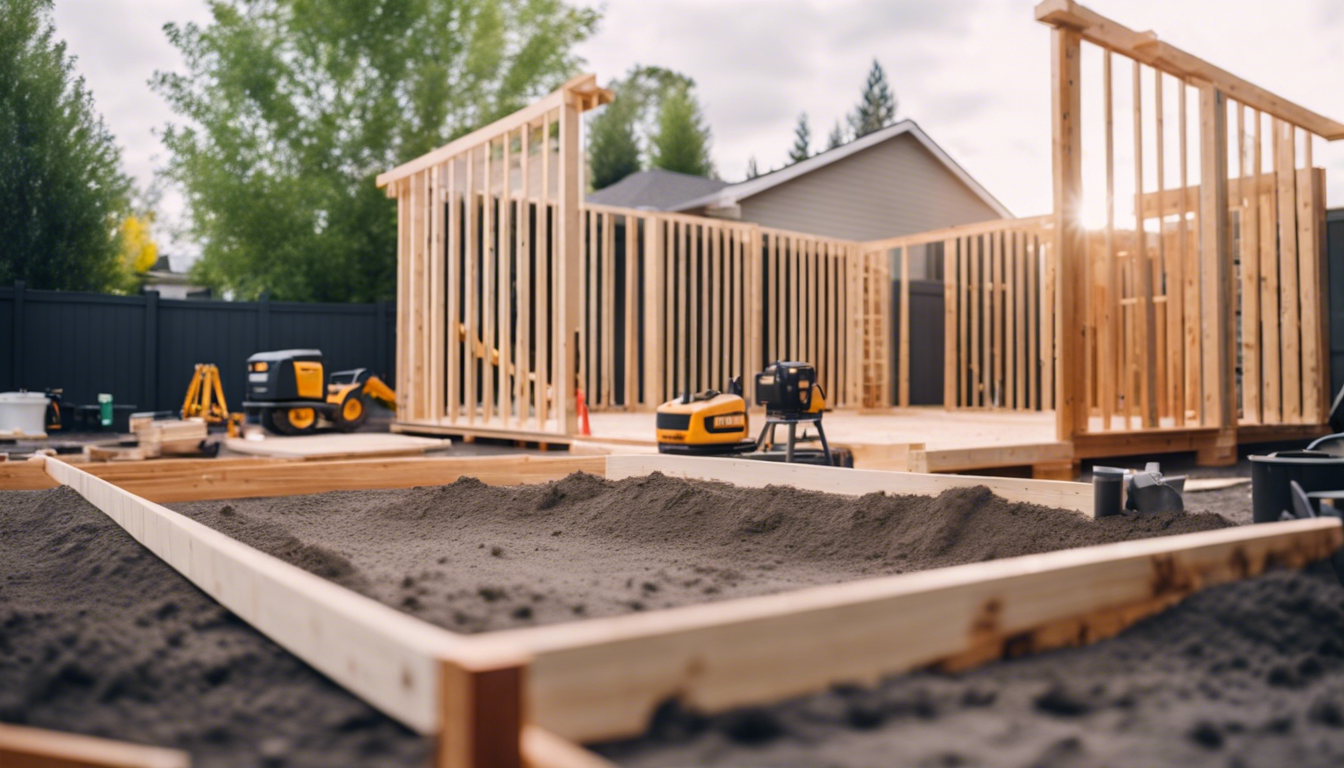The Importance of ADU Permits: Preventing Legal Issues
- #Outdoor Living

- Smooth Plaster Finish
- Shimmering Pebble Finish
Obtaining ADU permits is crucial to ensure legal compliance with local building codes and avoiding severe penalties including fines and forced demolition of unpermitted structures. These permits verify that the construction meets safety standards, which also helps in avoiding insurance issues and enhancing property value.
Understanding ADU Permits
An Accessory Dwelling Unit (ADU) permit is essential for anyone looking to build an ADU, whether it’s a new structure or a conversion of an existing space. This permit ensures your project complies with local zoning and building codes, which vary by city or town.
Key Steps in Getting an ADU Permit:
- Pre-Approval and Zoning: Before applying, check if you need zoning approval and get loan pre-approval if financing is needed.
- Documentation: Collect necessary documents like a site survey, ADU blueprints by an architect, and a list of licensed contractors.
- Application: Submit your application along with the required documents to the local building department.
- Review Process: Your application will undergo a review process, which might require changes to your plans based on feedback.
- Construction: Once approved, you must build the ADU according to the approved plans.
Important Considerations:
- Local Regulations: Understand the local regulations regarding lot size, ADU dimensions, property line setbacks, and other zoning requirements.
- Permit Types: Depending on your location, you might need multiple permits such as building, electrical, and location permits.
- Community Impact: Consider how your ADU will fit into the neighborhood, keeping in mind local concerns about density and infrastructure.
Building an ADU can enhance your property value and offer additional living space or rental income. However, navigating the permit process is critical to ensure your construction project is legal and up to code. For a detailed guide on constructing an ADU, visit Great Buildz.

Legal Consequences of Building without a Permit
California is seeing a surge in accessory dwelling units (ADUs) construction. Many of these units are built without the necessary permits, leading to potential legal and financial issues. Homeowners might face fines, insurance complications, and lawsuits from tenants if they skip the permit process.
- Legal Risks: Building an ADU without a permit can result in hefty fines and legal actions from tenants or city officials. Homeowners could even be forced to demolish the unpermitted structure.
- Insurance Problems: Unpermitted ADUs may not be covered by insurance policies. This lack of coverage can lead to significant financial losses in case of damage or accidents.
- Cost of Compliance: Bringing an ADU up to code can be costly and time-consuming. Homeowners may need to upgrade several aspects like the foundation, wiring, and plumbing to meet current building standards.
Local governments in some areas offer programs to help homeowners legalize unpermitted ADUs. However, the costs associated with these upgrades can still be substantial. It’s better to obtain the necessary permits before construction to avoid these complications.
Properly permitted ADUs offer numerous benefits including increased property value, compliance with safety standards, and eligibility for certain government incentives. It’s wise to work with professionals familiar with local ADU regulations to ensure compliance and avoid potential issues.
How to Apply for ADU Permits
Applying for ADU permits involves several important steps. Here’s a straightforward guide to help homeowners through the process:
- Research Your Property: Start by understanding the specific regulations and requirements for ADUs in your area. This will help you prepare the right documents and plans.
- Prepare Your Application: Gather necessary documents such as property plans, and contact a design professional if needed. You’ll need detailed blueprints and possibly a site survey. Check out the requirements from the City of Portland for pre-approved building plans and San Diego’s guidelines at ADU Geeks.
- Submit Your Application: Apply for the building permit and any other required permits. This can usually be done online or in person. Ensure all forms are filled out completely and accurately to avoid delays.
- Pay Fees: Be prepared to pay building permit fees, water service fees, and System Development Charges. These fees vary depending on your location and the specifics of your project.
- Follow Up on Your Application: After submission, keep track of your application’s status. You may need to make corrections based on the feedback from the planning department.
- Schedule Inspections: Once your permit is approved, you can start construction. Remember, the city will need to inspect the construction at various stages to ensure everything is up to code.
- Final Steps: After passing all inspections, you’ll need a Certificate of Occupancy to confirm that the ADU is safe and ready for use.
Remember, adding an ADU can increase your property’s value, which might raise your property taxes. It’s wise to talk to your county assessor’s office to understand these potential impacts before beginning your project.

FAQ
What is an ADU permit and why is it necessary?
An Accessory Dwelling Unit (ADU) permit is required to ensure that the construction or conversion of an ADU meets local zoning and building codes. It is necessary to guarantee compliance with various regulations specific to your location, which can include lot size, property line setbacks, and overall dimensions.
What are the key steps involved in obtaining an ADU permit?
The key steps in obtaining an ADU permit include: getting pre-approval for zoning and financing, collecting necessary documentation such as site surveys and blueprints, submitting an application with the required documents, undergoing a review process where modifications might be necessary, and finally, construction according to approved plans.
What could happen if I build an ADU without obtaining the necessary permits?
Building an ADU without the necessary permits can lead to serious legal and financial consequences including hefty fines, the possibility of legal action from tenants or city officials, insurance coverage denial, and potentially having to demolish the unpermitted structure. Additionally, you may face high costs and extensive upgrades to bring the unit up to code later.
What should I consider about local regulations before starting an ADU project?
It is essential to understand your local regulations concerning lot size, ADU dimensions, and property line setbacks. Different areas might also require multiple types of permits (such as building, electrical, and location permits) and have specific concerns about community impact like neighborhood density and infrastructure.
How can I apply for an ADU permit?
To apply for an ADU permit, you should start by researching the specific regulations in your area, prepare the necessary documentation like property plans and detailed blueprints, and submit your application either online or in person. Following the application submission, you should pay any required fees, follow up on the application’s status, schedule necessary inspections during construction, and finally acquire a Certificate of Occupancy.
What are the financial implications of adding an ADU to my property?
Adding an ADU can increase your property’s value, which may also raise your property taxes. It is advisable to consult with your county assessor’s office to understand the impact on property taxes before starting your project. It’s also important to budget for permit fees, water service fees, and System Development Charges that vary by location.
What are the benefits of obtaining a proper permit for an ADU?
Obtaining the appropriate permits for your ADU ensures that your construction project is legal, safe, and compliant with local building codes. This not only helps in increasing the property value but also makes sure the unit is eligible for insurance coverage and certain government incentives, ensuring long-term security and profitability.









